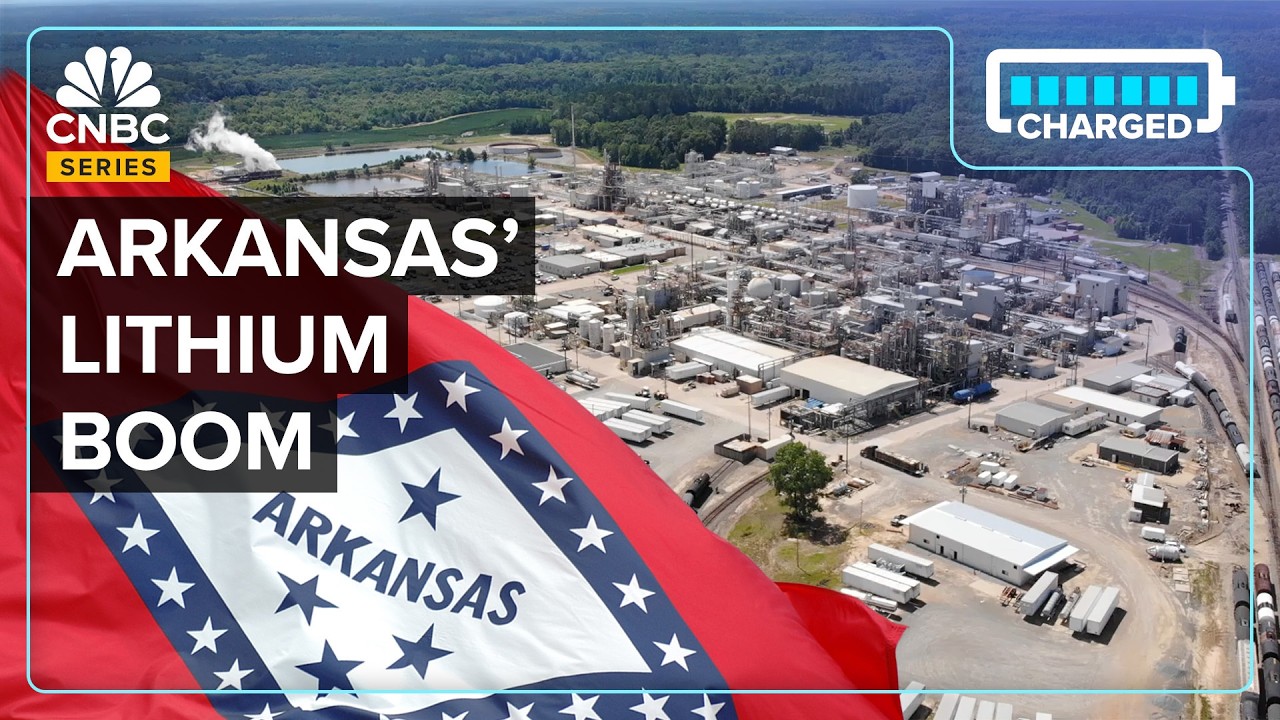This is Magnolia, Arkansas, once known for its oil. This small city in the south of the state is now the Epicenter of a new energy revolution lithium. It's been identified by the government as critical for The national security of the country, and new projects Need to be built, but no one wants to mine in their Backyard. Arkansas is different. Lithium has become critical for electric vehicle Batteries and the clean energy transition. Since 2017, the demand has tripled, with projections Showing a ten fold increase by 2050. In 2023 alone, global consumption hit 180,000 metric Tons due to rising EV sales and energy storage needs. Currently, the U.S. produces less than 1% of the World's lithium, with most of it happening in Australia, Chile and China. But new projects in California, Nevada and Arkansas Are set to boost domestic production. I think the U.S. Can become a leader in global lithium production. And Arkansas, I think, is a nice beginning of that. Arkansas's rich lithium reserves have attracted big Investments companies like Standard Lithium, ExxonMobil and Albemarle are building new extraction And processing facilities in the state, aiming to Secure a new domestic supply of lithium. The way we're approaching the projects using direct Lithium extraction is one of the most sustainable and Responsible ways to build a lithium facility. But why Arkansas? Because of the Smackover formation, the 8000 foot deep Permeable limestone aquifer stretches from Texas to Florida, with its center in southern Arkansas. The bromine rich brine, which is essentially super
Salty water here, contains up to 445 parts per million Of lithium. Arkansas sits on the highest grade lithium brine Resource in North America, the only one that's Comparable to South America. The rock here is very porous and permeable, so it's Actually easy to get that brine out and route it to a Processing plant such as this. But lithium prices have fallen more than 80% in the Last few years, now costing about $10,600 per metric Ton. The lowest price since 2020. Lithium prices are falling precipitously. And these many of these are standalone lithium Companies. They now are not getting the revenues they Need. Despite recent price drops, the initial surge and rapid EV growth triggered a global lithium rush with Significant ongoing investments. CNBC visited Magnolia and El Dorado in Arkansas to Explore why the state is emerging as a key player in The lithium market and to examine the economic, Technological and strategic impacts of its extraction Initiatives. Lithium is the lightest metal in existence, and it's Also the least dense solid in existence. So because of its chemistry, it has basically high Electrochemical potential and then low density at the Same time. Historically, lithium was used in pharmaceuticals, Ceramics glass and lubricants, but today about 87% of Lithium is used for batteries in EVs, smartphones, Tablets and laptops. If we then look ahead to 2030, what we're expecting is That demand to almost triple for lithium, so it's
Going to reach almost 3 million tons by 2030. And that is being driven primarily by growth in the EV Market. Arkansas has a lot of experience with the brine from The Smackover formation. The state is the largest bromine producer in the US, Which is used as a fire retardant and as a chlorine Substitute in pools, among other things. This area is where the brine comes into the plant. Again, a large pipeline, some of the pretreatment to Get the brine ready for the actual bromine production. That's over behind me. And then once we produce the bromine, we have a very Large footprint of of processes that convert that Bromine into other products that are used in our daily Lives. So brines have actually been pumped from this formation In Arkansas since around the 1950s to extract bromine. So you have this combination of the availability of The resource and an existing extractive industry, Which is already extracting that brine. So that's what makes Arkansas quite an attractive Destination for lithium extraction. Standard lithium focus is to build a US lithium supply Chain. We've targeted the Smackover formation in Arkansas because not only is it the highest grade, but It's in a region where you can actually build a Project. This area has been a key energy provider to The United States for 100 years. The Smackover formation is attracting companies like ExxonMobil, Albemarle and Standard Lithium, all Looking to develop their projects in the area. Albemarle is the world's largest lithium producer. It recently gained approval to test direct lithium
Extraction technology in Magnolia, Arkansas. We're very confident that we have a nice advantage here Again because we've been dealing with this brine for 50 years. We have the infrastructure in place, roughly 300 miles Of very large piping to get the brine from the wells To our conversion asset. In June, oil giant ExxonMobil signed a non-binding Agreement with South Korean battery maker SK to supply Up to 100,000 metric tons of lithium from Arkansas for EV batteries. Exxon acquired 120,000 acres in the Smackover formation. The company said production of its battery grade Lithium will begin by 2027, aiming to supply enough For a million EVs annually by 2030. Finally, standard lithium has been running an Industrial scale direct lithium extraction Demonstration plant in El Dorado, Arkansas, since May 2020. The plant has successfully produced high purity Lithium coke strategic platforms, invested $100 Million in standard lithium to further develop its Arkansas project. We are fortunate that we developed a relationship with The largest brine operator in Arkansas, Lanxess. That relationship allowed us to work with inside their Existing operations so we could understand how to get The lithium out of the brine. That's the critically different part about South Arkansas. Most of the world's lithium comes from Australia and Chile, with shipments going to Chinese processors and Battery makers. Lithium is usually extracted in three ways hard rock Mining in Australia, sedimentary rock extraction under
Development in the US, and brine evaporation from South America's Atacama Plateau. The evaporation method takes months to separate Lithium from the brine, but. It also has a massive environmental footprint, very Poor recoveries and a process that's literally Thousands of years old. American lithium production makes up less than 1% of Global supply, but Arkansas aims to change that. The direct lithium extraction being used in Arkansas is The most latest technology that is definitely much More environmentally sustainable, and it's also can be Lower cost. Direct lithium extraction, or DLE uses advanced filters To separate lithium from brine, making the process More efficient and eco friendly. It also requires less energy and water. DLE is targeted at extracting lithium From brines, so within a brine you're going to have Lithium, you're going to have some bromine, as he Said, but maybe manganese and all sorts of other Things. So it's targeted at extracting that that Lithium from the brine. DLE now aims to filter lithium from this brine before It's re-injected underground, avoiding traditional Evaporation ponds. The Smackover holds more than 4 million metric tons of Lithium, enough for millions of electric vehicles and Devices. And although extracting lithium from brine Can be complex, companies are racing to deploy DLA Commercially. Over the past decade, the US Department Of Energy has focused DLE research on California's Salton Sea, which is another lithium rich brine Resource. But the Salton Sea presents challenges.
The brines are very hot, salty and slightly acidic. I think with the Salton Sea as well, there's Difficulties around the the brine is quite corrosive In my understanding, and I think it's also a Geothermal operation. So that means that brine is at high temperatures, so It's more difficult to handle. Arkansas benefits from more favorable conditions. Its brines are cooler, less acidic and have higher Lithium concentrations. Another advantage for Arkansas is its existing Infrastructure from the bromine industry, which can be Repurposed for lithium processing. Arkansas has an existing brine industry. They've been extracting bromine from brine for 60 Years, pumping brine to the surface, extracting Bromine and putting that brine back into the ground. So an existing regulatory environment, that's the same Process that we're proposing to do to extract lithium, That removes the challenges that many projects face With permitting. But challenges remain with direct lithium extraction, As the technology has yet to be proven at scale. It's not yet been commercially proven, and therefore we Don't know yet whether it's scalable. What I would say is that available resource, Particularly in Arkansas, um, is probably not going to Be the limiting factor on how scalable it is. What's going to be the limiting factor is the Technology. If the technology can work and can work at Scale. Meanwhile, the lithium market is changing rapidly. In 2022, the price for lithium carbonate soared to Over $80,000 per metric ton, and it's since fallen to
Around $10,600 per metric ton. The 80% decline is mainly linked to oversupply, slower Electric vehicle growth and competition from new Battery technologies. On top of this, China controls 80% of global battery Cell production, putting U.S. Supply chains at risk. Price always follows like demand, but also like future Demand. And so what happened is that a lot of this Lithium was being bought. And the price skyrocketed up all the way through 2023, And China purchased all the lithium to process it to Make the batteries. Now we're seeing a drop in demand from where we Thought it would be, so that 70, that high price of Lithium was projecting a continual escalated growth or Exponential growth and electric vehicle sales. Electric vehicles now outside of China, it's like, Say, in Europe and North America, the growth rates Have fallen. Yes, they're still selling them, but they're not Getting that exponential rate that they thought they'd Have. Lithium is an industrial commodity basically. So the prices of lithium are dictated by the supply And demand fundamentals of the market. Without lithium well you can't have an energy Transition without lithium. The companies in the region said they plan to move Forward with their Arkansas projects, despite the low Price of lithium. In a statement, ExxonMobil said we're committed to Being a leading lithium supplier and are laying the Groundwork for a successful business in Arkansas.
Lithium is critical to all technology. There wouldn't be social media without the lithium ion Battery. Portable electronics, every power tools, Stationary storage all require lithium. It is, after the semiconductor, probably the most Important technology evolution of the 21st century. The lithium ion battery has changed all industries. We foresee a strong future for lithium right globally, And lithium is important not only for the transition To EVs right as our transportation mode, but also for So many other things that are essential to our daily Life, like the pharmaceuticals that you take the Gorilla Glass on your electric cooktop also contains Lithium. There's just a myriad of uses for lithium, Even beyond EVs, which is what we think of more when We talk lithium.





